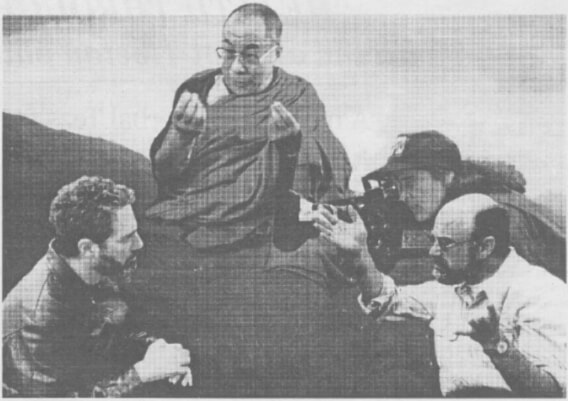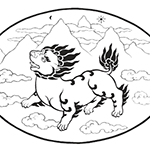| The following article is from the Spring, 1997 issue of the Snow Lion Newsletter and is for historical reference only. You can see this in context of the original newsletter here. |

There is a another Tibet-related film in the making: The Jexv in the Lotus, inspired by Rodger Kamenetz's book. The story, as told by filmmaker Laurel Chiten, follows Kamenetz's unintentional spiritual journey.
In 1990, eight Jewish delegates traveled to Dharamsala, India, to meet with the Dalai Lama. Conscious of the parallels to Jewish history, the Dalai Lama had asked the Jews, Tell me your secret of Jewish spiritual survival in exile. Rodger's life-long friend, Dr. Marc Lieberman, a self-proclaimed JUBU (a Jewish-Buddhist) had organized this meeting. He asked Rodger to come along and chronicle the event. A confirmed materialist who never looked to religion for answers to life's problems, Kamenetz was an unlikely pilgrim. But he was the perfect person to question. He was a man who was lost and didn't quite know it.
When he set out on the trip to India, Rodger wasn't even sure if he could rise to the occasion. His life had slipped its moorings. The death of his infant son and the derailing of his career had left him adrift in a sea of self-doubt. For the Jewish leaders who were asked to meet with the Dalai Lama, there were also doubts. What did they have to share? Was there, in fact, a secret? Weren't many Jews looking elsewhere for answers, turning to other religionssuch as Buddhism? Marc Lieberman wondered if the Jews and the Tibetans could bridge the gap between their vastly different worlds. Rodger was more concerned whether these two groups of people would be able to communicate. Monks are inclined to silence and Jews like to yak.
In Dharamsala, Rodger was surrounded by sufferingthe overwhelming poverty of India, the diaspora of the Tibetans. Yet in the Dalai Lama and the Tibetan Buddhists he encountered people who faced suffering with equanimity, with resolve, with compassion. For the first time, he felt the power of a spiritual tradition. His finely wrought defense system began to crack, leaving him open to his own grief, despair and longing.
An observer no more, he began to look for a way out of his own pain, his own exile. He found it in a very unexpected place. In the encounter between the Dalai Lama and the Jewish leaders, Rodger began to discover the beauty and power of his own tradition. The Dalai Lama provided us with a pool of nectar to look into. In it we saw Judaism reflected more sweetly than we had ever experienced it in our everyday lives. And in that sweet reflection, we saw the richness, the value, and the depth of Judaism.
As a filmmaker, Chiten says, I saw the potential for The Jew in the Lotus to reach far beyond the Jewish community and appeal to a broad and diverse audience because it focuses on the personal transformation of a non-seeker. Kamenetz as every man'as an outsider, rather than a discipleenables viewers to wonder and stumble along with him as he uncovers what it might be like to have one's life guided by a spiritual tradition.

Filmmaker Laurel Chiten
Chiten's film has not had any direct opposition from China, unlike the other film projects. She faces another obstacle, however, as an independent producer. Chiten is dependent on grants and private donations to finish the film. With the film's expected release by the end of the year, financial support is still urgently needed. All contributions are tax deductible. For more information please contact: The Jew in the Lotus Film Project, Blind Dog Films, PO 238, Waban, MA 02168, 617-965-0712. Make checks payable to: The Newton Television Foundation. ä_æ

